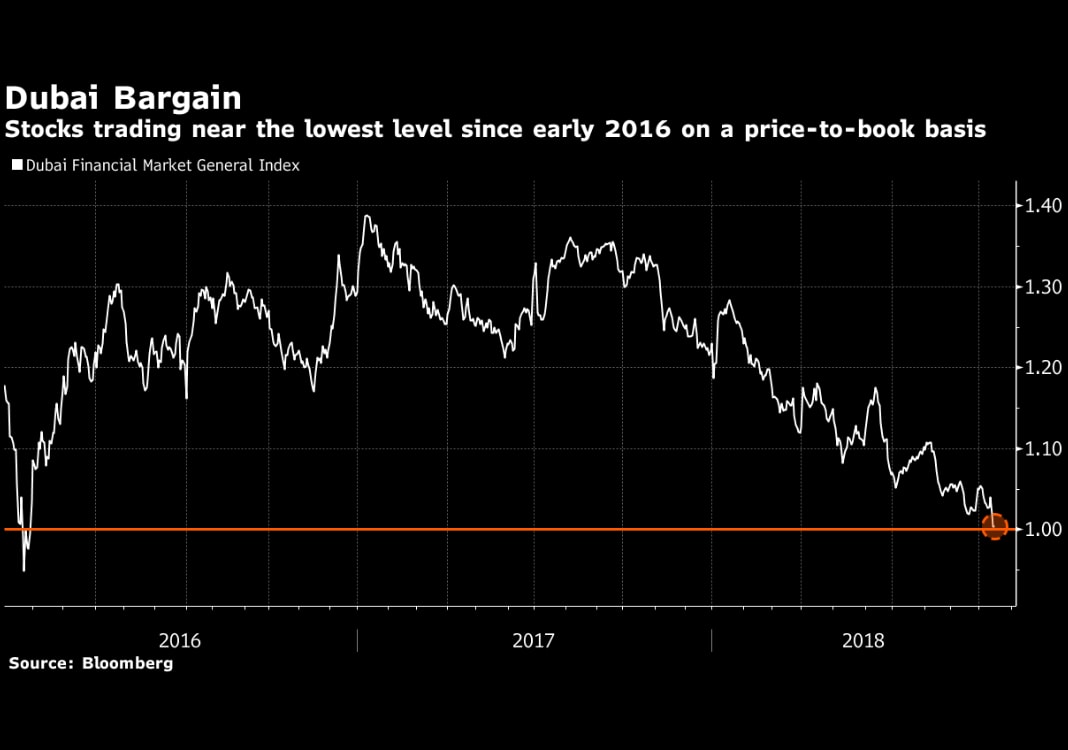Economy
Saudi Tensions Add to Dubai Stock Market’s Worst Year Since 2008

Traders are running out of reasons to stay in Dubai’s stock market as it heads for its worst year since the 2008 debt crisis.
Dubai’s main equities gauge has lost 19 percent this year, pressured mostly by real-estate developers. The index is now caught between increasing geopolitical woes centered at its neighbor Saudi Arabia and those emanating from global emerging markets.
Saudi Arabia’s main index climbed 1.8 percent for the week as of Tuesday’s close. That followed a slump on Sunday amid the growing diplomatic row over the disappearance of Saudi journalist Jamal Khashoggi, and analysts speculated that government-related funds were subsequently used to boost the securities. In Dubai, the benchmark showed no recovery and it is down 1 percent for the week.
The recent events involving Khashoggi’s disappearance, “the strength of the reaction by the U.S., and also the market move, showed we are dealing with a totally different ball game,” said Ami Kemppainen, a portfolio manager at Terra Nova Capital Advisors Ltd. When looking at the spillover effect from emerging-market woes and geopolitical matters in the region, Dubai could be caught “in a double whammy,” he said.
Saudi Arabia is preparing a report that will say Khashoggi’s death was the result of an interrogation that went wrong, according to media reports.
Low Volumes
Economic activity in the emirate has been lagging as real-estate prices dropped and domestic demand faltered, prompting the government to announce measures to stimulate growth. A Dubai economy tracker index, compiled by Emirates NBD PJSC, showed in September the slowest rate of expansion since April.
“Traditional growth engines of the Dubai economy such as real estate, trade, transport and hospitality, have remained weak this year,” said M.R. Raghu, the head of research at Kuwait Financial Centre SAK, which manages more than $3 billion. “Business sentiment has remained subdued.”
Last month S&P Global Ratings cut the credit worthiness of the emirate’s utility monopoly and a company that owns properties in the financial center, saying that deteriorating “credit conditions” may affect the ability to provide support to the firms.
Some other metrics of Dubai’s stock market at the moment:
The benchmark is now down almost 50 percent from a historical peak in 2014, the year it was added to the emerging markets category by MSCI Inc. The estimated price-to-earnings ratio in the next 12 months was at 7.5x, indicating the market is cheaper than average for emerging markets and any other major benchmark in the Gulf The Dubai Financial Market Insurance sub index is the only one out of nine sector indexes up so far this year Daily average value of trade in Dubai’s stock market has plummeted back to near the level of 2012

Recovery Efforts
But there are signs of hope. The U.A.E. government has been stepping up attempts to foster longer-term growth, which could boost sentiment in the stock market. Last month, it said it would allow foreigners, who comprise the bulk of the population, to obtain extended residency visas after they retire.
The economy is likely to turn a corner next year with Dubai’s Expo 2020 infrastructure projects, changes to visa rules and increased government spending, said Kuwait Financial Centre’s Raghu. “Subsequent improvements in the earnings could “prop up the market,” he added.
Dubai’s market “has been a disappointment to investors so far in 2018,” said James Johnstone, Miami-based co-head of emerging and frontier markets at RWC Partners, which invests in the sheikhdom’s stocks. “However valuations look very attractive now in property and bank stocks, and I would expect to see the market recover sharply in 2019.”
– Filipe Pacheco and Netty Ismail
-

 Banking & Finance2 weeks ago
Banking & Finance2 weeks agoOman Oil Marketing Company Concludes Its Annual Health, Safety, Environment, and Quality Week, Reaffirming People and Safety as a Top Priority
-

 Economy2 months ago
Economy2 months agoMaal Card: What Oman’s New National Payment Card Means for Everyday Users
-

 News2 months ago
News2 months agoSheikh Suhail Bahwan, Chairman of Suhail Bahwan Group, Passes Away
-

 News1 month ago
News1 month agoOIG Appoints New CEO to Lead Its Next Chapter of Excellence
-

 Economy2 months ago
Economy2 months agoOman Unveils Official Omani Rial Symbol in Landmark Move to Boost Global Currency Presence
-

 News1 month ago
News1 month agoReport: How India & The Middle East Are Exploiting Immense Economic Synergies
-

 Uncategorized1 month ago
Uncategorized1 month agoOman’s ISWK Cambridge Learners Achieve ‘Top in the World’ and National Honours in June 2025 Cambridge Series
-

 Trade2 months ago
Trade2 months agoConsulate Office of the Republic of South Africa opens in Muscat, enhancing bilateral relations





























You must be logged in to post a comment Login